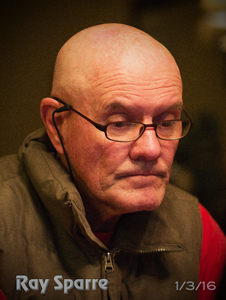
Hi, Zane.
In a little over an hour I need to be back at my sawmill to carry on with processing a bunch of logs I started with yesterday afternoon at a nearby property. As the dogs see me put on boots and coat, etc., they are always watching me intently with a clearly implicit question—“Do I get to go? Do I get to go?” They have learned that going with me opens up for them new vistas of FUN. The guy I’m working for has a couple dogs too. So all of them did indeed have fun yesterday. Once I begin a cut with the mill, I can leave it on a selected cut setting for a few seconds which allows me enough time to toss up to 4 tennis balls for the dogs to chase. They absolutely love it! It’s like their passion—like their world view convinces them, “God made me for this!”
Have a great day—chasing whatever you think God made you for. Love and prayers—Tua/Ray.
I don’t wish to be too hard on Peter, but as he is preaching here to the crowd that has gathered surrounding the sensational healing of the crippled beggar, he forcefully says, “You disowned the Holy and Righteous One.” I think it would have been quite appropriate for someone to tap Peter on the shoulder at that point and say, “Hey, Peter—so did you! Three times. Remember?”
Do I have some kind of twisted delight in rubbing people’s noses in their failures? No—I don’t think so. But I’m certainly aware that we all have a dirty little tendency in our human nature to be more preoccupied with the failures of others than with our own. That’s what Jesus warned about in Matthew 7:3-5: “Why do you look at the speck of sawdust in your brother’s eye and pay no attention to the plank in your own eye? How can you say to your brother, ’Let me take the speck out of your eye,’ when all the time there is a plank in your own eye? You hypocrite, first take the plank out of your own eye, and then you will see clearly to remove the speck from your brother’s eye.”
I believe that one of the best and most effective strategies of effective testimony is to admit failure. It helps to present one as real, as human, fallible, and credible. I’ve wondered on occasion if it isn’t one of the most neglected forms of ministry in the church. Who can argue against an honest 3-point testimony that says,
We never hear Peter make specific reference to his failures. Nevertheless, we can be sure that those failures taught him a thing or two. It was Peter who later went on to say, “All of you, clothe yourselves with humility toward one another, because, ‘God opposes the proud but gives grace to the humble.’ Humble yourselves, therefore, under God’s mighty hand, that he may lift you up in due time” (1 Pet. 5:5-6). I would judge that this sound advice is largely the product of Peter’s own experience of learning about God’s grace and power that he could not have understood so well apart from the medium of failure.
So, don’t waste your failures! Learn from them! That’s wisdom!